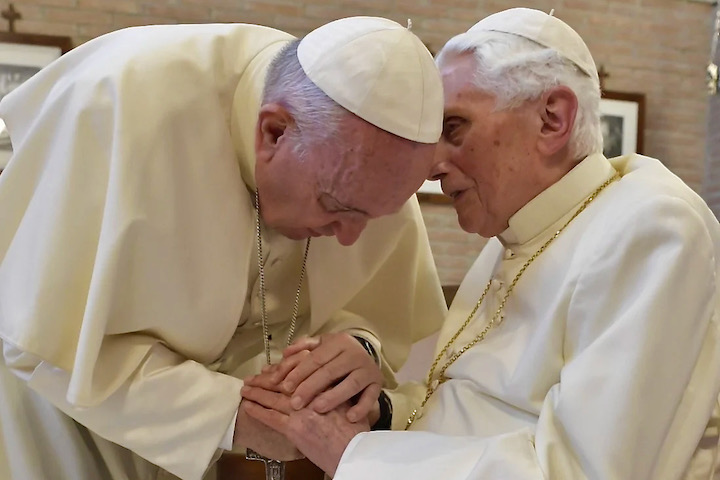For someone who wasn’t there, it becomes increasingly difficult to reconstruct what actually happened in the Church “Post Vatican II.” I was aware of it, at first, as a pre-Christian, which is to say, not even as a sympathetic observer. Years would pass before I reached an age where I knew Catholics who cared; but then I met some fine ones.
By the time I was becoming a Christian (at the age of twenty-three), my “natural preference” was to be received as a Catholic, but my rational will joined the Anglican communion. This was because the Catholics were cutting a sad figure, especially by comparison in England, where I then lived.
While I did not encounter any “clown masses,” I wouldn’t, because I wasn’t attending Church; and by carefully guiding my footsteps along the paths of very High Anglicanism, I could avoid similar scandals in my adopted religious environment. It was not until the 1980s that, with women priests and so forth, the Anglicans started to move away from me, and in effect, to evict their congregation; I saw them start for the doors.
One might have expected the Catholic pews to fill up, with the fleeing “C. of E.” But no. This is where the “Spirit of Vatican II” had its effect. There was no, or very little, enthusiasm in all the Popish places, that I could discern, except where Pope John Paul II’s personal “charisma” sang a song.
Or perhaps I should generalize, for I was becoming aware of more and more remarkable individual Catholics – including even priests – who were an argument for religious faith and commitment.
For no matter how bad things get, there will always be – or there have always been – sincere Catholics. As one grows older, in my case, one grows familiar with them. The Church becomes personal, so that, one can no longer leave the Church easily. Instead, one is confronted with the prospect of multiple acts of betrayal.
But I didn’t face this until the last day of 2003; for staying out was the secret of a shallow happiness. I could follow events inside, as a kind of half-Catholic.
The person I admired most among living bishops, Joseph Ratzinger, did not become pope until the spring of 2005. This seemed to me at least a minor miracle, for I’d never expected so thoroughly admirable a man to occupy the highest station in the Catholic Church; or more remarkably, two in a row. Perhaps my standards weren’t high enough, but I was exhilarated.
And Pope Benedict XVI lived up to my expectations, especially by his measures in Summorum Pontificum, but also by his work through Anglicanorum Coetibus, in which, to my mind, he showed brilliant spiritual diplomacy in recovering parts of the Church that had been smashed (a long time ago, in the Anglican example).

But more than this, his three encyclicals (Deus Caritas Est, Spe Salvi, Caritas in Veritate) are a genuine supplement to the profundity of Catholic teaching, and beyond them, his books on many themes and topics are a treasure. Such phrases as “dictatorship of relativism” served, superficially at first, to put the Church back on its “Cold War footing” against a world that is smug, very glib, and habitually dishonest.
We have been discovering how valuable a treasure his teaching was, through his retirement, in all these Latin (but carefully translated) texts. For Ratzinger has been a model of German thoroughness in all his writings, but also of Christian charity and forbearance, as the Holy Father of our “tribe.”
His election was not a total surprise, given the man’s prestige as a prince of the Church; but an unpleasant turn for the self-declared liberals, whom we now know were working against him even in the Conclave. Their destructive efforts against his (provocatively mild) efforts to clean house were notorious. It often appeared to be one man against a mob.
His resignation was, by his own account, justified because he was too tired and weak to continue. He had already reached a great age, and wanted to retreat into a life of prayer, within what monastic arrangements were still possible. He tried to find a gracious moment to step aside.
I have tried to give a kinder summary of Pope Benedict’s broad contribution to the papacy, distinct from the excessively political account one reads from most sources today, in which he is presented as a “Conservative,” – i.e., merely on one side of an intensely political squabble that does not have much to do with God, Revelation, Salvation, &c.
By contrast, Jorge Bergoglio, the incumbent Pope Francis, was a very political choice, “for the times.” His election was already a scandal, because “progressives” had openly campaigned for him – disqualifying him, as a pope had recently reaffirmed. But we are now at a moment when, in canon as in secular law, justice is selectively applied.
This needs to be understood, to make sense of Bergoglio: of his rise in Argentina, his success in Rome, and his record as pope.
We may think of him as a champion of the “Spirit of Vatican II,” and he is, but only as that “spirit” is taken to be demonic. To look back, reasonably, over the heritage of Vatican II, and of what could be said to emerge from it, is to realize that popes Wojtyla and Ratzinger were the professed embodiments of it. In their papacies, each sought to complete unfinished work of the Council, in a Catholic spirit.
The liturgical changes that resulted in the Novus Ordo were from their beginning a deviation from Vatican II, with its stress on making the existing Mass (in Latin) understood. The revolutionary Bergoglio has leapt in to make the deviant normal, and make what was once again becoming normal painfully illegal.
I watched the first act of this tragedy in the 1970s, from a safe distance. But now, after an interlude, that ugly “Spirit” has returned.















